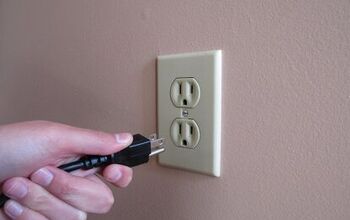Are Plastic Hangers Recyclable?

When you upgrade your closet to fancy wooden or velvet hangers you might feel a sense of accomplishment. After all, it is “adulting” in the purest sense of the word. Your closet, and even your clothes themselves look happier and more expensive. But when you look down and see a large pile of plastic hangers at your feet, you are likely left wondering what on earth are you supposed to do with them.
Plastic hangers can be recycled and repurposed in a number of ways. Find out what type of plastic your hangers are made of then check your local recycling guidelines to see if you can put them directly in the recycling bin. If you cannot recycle them this way, try donating your plastic hangers. Thrift stores, shelters, hospitals and even dry cleaners often accept free hangers.
Before you think about tossing your old plastic hangers in the trash consider how they can be repurposed. If you take a few steps, you might be able to do your part to keep plastics out of landfills.
Can Plastic Hangers Go In The Recycling Bin?
When you have a bunch of plastic hangers to get rid of, your first thought is probably to put them in the recycle bin and forget about them on the curb. Unfortunately, it often isn’t that simple. While some hangers can be recycled that easily, others cannot. In order to find out if your hangers can be recycled via your recycling bin you need to know a few things first. First you need to find out what your hangers are made of, and then you need to figure out what your municipality’s recycling policies are.
Check Your Local Recycling Policies
When you get ready to throw plastic into your recycling bin, you likely have asked yourself “is this even recyclable?” The answer to that question is – it depends. Recycling policies vary widely from state to state. Even different countries within the same state can have drastically different recycling rules. In order to find out if you can put your hangers in the recycle bin you should review your local recycling policies. Most cities have a detailed list of exactly what kind of plastics they accept, and when and where they accept them.
Determine What Type Of Plastic Are Your Hangers Made Of
Once you determine what type of plastics you can put in your recycling bin, you need to discover what type of plastic your hangers are made of. There are many hanger types. Oftentimes hangers have a recycling number on them. This makes things easy, as you simply have to check the number with your local recycling policies to see if your hanger can be recycled locally. If it can not, or you cannot determine the exact type of plastic, don’t worry. There are other options.
Donate Your Plastic Hangers
Possibly the best way to recycle your hangers is to donate them to people or an organization in need. This not only prevents unnecessary waste, but also helps those who may need it most. Here are some of the best places to consider donating your plastic hangers.
Hospitals and Nursing Homes
Hospitals and nursing homes frequently take hanger donations. Before you walk into a hospital with a big box of hangers, however, be sure to call first. Hospitals are often very thankful to have certain donations, but they don’t always need certain items. Hospital workers are often very busy. Do your best to communicate and coordinate before donating.
Thrift Stores
Thrift stores are almost always looking for more hangers to hang merchandise. Goodwill And Salvation Army are perhaps the two most popular thrift store chains run by charitable organizations. You can donate your plastic hangers to either of these organizations. In fact, you can donate large amounts of hangers that are in good condition, and these stores may actually re-sell them, with the proceeds benefiting their charities.
There are other smaller thrift stores you also may want to consider bringing these hangers. Many churches and other religious denominations have thrift stores that rely almost entirely on community donation and support to keep them going. Even small local vintage stores appreciate your donation. It is not always easy to have a small brick-and-mortar business these days, and you donating hangers could help.
Dry Cleaners And Laundromats
One place that always needs hangers is a dry cleaner. Sure, they mostly all have their own wire hangers that they purchase, but the odds are they will take quality plastic hangers as well. While these hangers may not end up in charitable hands, it is often a simple way to make sure your plastic hangers continue to get used, and don’t end up in a landfill.
Shelters
Local shelters are often grateful for everyday household donations. This includes plastic hangers. Similarly to hospitals, shelters are often stretched thin in the labor department. Do your best to coordinate a time to drop off your plastic hangers (and any other donations you may have). Many shelters have posted guidelines and information about donations to make this easier.
Give Your Hangers Back To Retailers
Many retailers now take back hangers at the time of purchase, unless the purchaser is interested in keeping the hanger. If you purchase clothing and notice the retailer is including the hangers in your bag, you can request they keep and recycle the hangers. Most retailers will reuse, or at the very least recycle, the hangers you leave behind.
You can also return to some stores after the time of purchase to see if they will take your hangers back. Some retailers have begun “green initiatives” that highly encourage them to take back hangers and other potential waste. This helps lower their carbon footprint, which is becoming a quality many shoppers look for in a company.
Try To Upcycle Your Hangers With DIY Craft Projects
If you can’t seem to find a new home for your plastic hangers, maybe try incorporating them into a fun project. There are all sorts of different craft projects using plastic hangers.
If you have young children in the house this can be a great opportunity to create a fun art projecting your plastic hangers. These projects can be time well spent with your children, and will help keep plastics out of landfills.
Can I Just Throw Away My Plastic Hangers?
Throwing out your plastic hangers should be a last resort. It is often easier than you think to find a home for your unwanted hangers. If, however, you have not found anyone to take them off your hands you may have no other choice. If the hangers are broken, you also may also have to throw them away.
Before throwing your hangers away, make sure the plastic is not recyclable in any way. If you confirm the plastic used is non-recyclable then deposit it in the appropriate trash bin. While this feels wasteful, at least you did everything you could to try and recycle the product.
Sometimes objects you bring into the home simply are not recyclable, and cannot be repurposed. If you have taken the time to try and recycle, and failed, you likely learned a valuable lesson. This process probably inspired you to bring fewer non-reusable plastics into your home in the future.
Concluding Thoughts On Recycling Plastic Hangers
There is almost always a way to avoid throwing your plastic hangers directly into the garbage. Sometimes you can simply place your unwanted plastic hangers in your recycling bin, if it was made of plastics your municipality can recycle. If you are unable to put your hangers in the recycling bin there are many other routes you can take.
Try donating your hangers. Often thrift stores, charity organizations, hospitals, and shelters are in need of hangers. You can also ask your local dry cleaner or laundromat, as they are almost sure to take extra hangers. If your hangers came from clothing purchased at a retailer, you can often bring them back. Many retailers have recycling programs of their own.

Tom Gaffey is an expert writer who currently resides in Washington D.C. Tom has a passion for real estate and home improvement writing, as well as travel and lifestyle writing. He lived the last twelve years in Hawaii where he worked closely with luxury resorts and event planners, mastering his knowledge of aesthetics and luxury products. This is where he found his passion for home improvement and a keen interest in DIY projects. Currently, Tom resides in Washington D.C, and also working on his debut fiction novel.
More by Tom Gaffey











![10 Best Electric Lawn Mowers - [2022 Reviews & Top Rated Models]](https://cdn-fastly.upgradedhome.com/media/2023/07/31/9070486/10-best-electric-lawn-mowers-2022-reviews-top-rated-models.jpg?size=350x220)
![How Much Weight Can a 4×4 Support Horizontally? [It Depends!]](https://cdn-fastly.upgradedhome.com/media/2023/07/31/9070333/how-much-weight-can-a-44-support-horizontally-it-depends.jpg?size=350x220)














